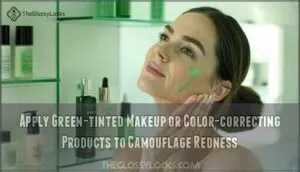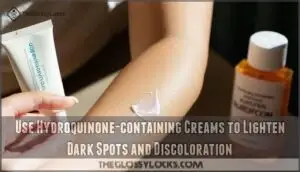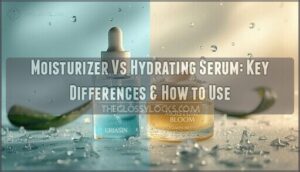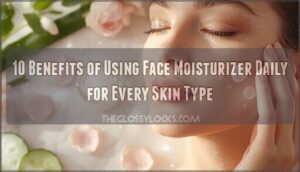This site is supported by our readers. We may earn a commission, at no cost to you, if you purchase through links.
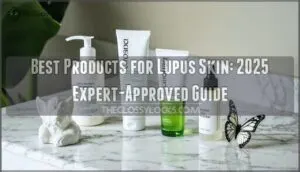
The best products for lupus skin start with broad-spectrum sunscreen containing zinc oxide – think of it as your daily armor against UV triggers.
You’ll want fragrance-free moisturizers that won’t make your sensitive skin throw a tantrum, plus gentle cleansers that clean without stripping.
Green-tinted color correctors work like magic to tone down that butterfly rash, while hydroquinone creams tackle stubborn dark spots.
Skip harsh scrubs and stick with products labeled "hypoallergenic" or "for sensitive skin."
Your skin’s already fighting one battle – don’t make it fight your skincare routine too, and with smart product choices you can transform your daily routine from survival mode to thriving.
Table Of Contents
- Key Takeaways
- Sunscreen and Sun Protection
- Managing Rashes and Discoloration
- Moisturizing and Soothing Skin
- Hair Care Considerations
- Emotional Support and Self-Care
- Frequently Asked Questions (FAQs)
- What is the best treatment for skin lupus?
- What lotion is best for lupus?
- What topical cream is good for lupus?
- What makes lupus rash better?
- What can I use for lupus skin?
- What should you avoid if you have skin lupus?
- How to cover up a lupus rash?
- What sunscreen is best for lupus?
- How do you treat lupus skin problems?
- Is there a cure for lupus?
- Conclusion
Key Takeaways
- Prioritize sun protection daily – You’ll need broad-spectrum sunscreen with SPF 30+ containing zinc oxide, and you should avoid peak sun hours between 10 AM and 4 PM to prevent lupus flares.
- Choose gentle, fragrance-free products – You cannot go wrong with hypoallergenic moisturizers, mild cleansers, and products specifically labeled for sensitive skin to avoid triggering irritation.
- Use color-correcting makeup strategically – Green-tinted primers and concealers will neutralize redness from butterfly rashes, while hydroquinone creams can help fade dark spots over time.
- Focus on soothing and hydrating ingredients – Look for products with ceramides, hyaluronic acid, aloe vera, or glycerin to calm inflammation and maintain your skin’s protective barrier.
Sunscreen and Sun Protection
If you have lupus, the sun isn’t your friend—it’s more like that neighbor who always shows up uninvited and causes trouble.
Living with lupus means your skincare routine becomes less routine and more like a carefully choreographed dance with flare-ups.
You’ll need to become a sunscreen expert and master the art of shade-seeking to keep your skin happy and flare-free.
Choose a Broad-spectrum Sunscreen With SPF 30 or Higher
Your skin deserves armor against the sun’s assault.
Choose broad-spectrum sunscreen with SPF 30 or higher for maximum SPF efficacy against harmful UV rays.
Mineral sunscreens containing zinc oxide work like tiny shields, reflecting light away from sensitive lupus skin.
Remember reapplication frequency—every two hours keeps protection strong.
Different formulation types suit various needs, but sunscreen ingredients should always include broad-spectrum coverage for complete sun protection.
Avoid Peak Sun Hours Between 10 AM and 4 PM
Between 10 a.m. and 4 p.m., when the UV index is highest, stay sun-smart to protect your lupus skin.
Here’s how:
- Adjust your schedule to prioritize indoor activities during peak sun hours.
- Seek shade if you’re outdoors — think umbrellas or a shady tree.
- Commute sun-safe, with UV-protective window films in your car or home.
- Dress for UV protection, with a wide-brimmed hat, long sleeves, and sunglasses.
Consider using films for UV protection on windows for added defense.
Managing Rashes and Discoloration
When rashes and discoloration show up, it can feel frustrating, but you’ve got tools to handle it.
Green-tinted makeup hides redness, and hydroquinone creams can help fade dark spots over time.
Apply Green-tinted Makeup or Color-correcting Products to Camouflage Redness
Got redness that feels like it’s taking over?
Green-tinted makeup is your superhero cape!
The green tint works wonders for redness neutralization, evening out your tone like magic.
Use a green primer for all-over coverage or color-correcting products like concealers for precise redness reduction.
Need hydration with subtle coverage?
A green-tinted moisturizer does double duty.
For a polished finish, green-tinted powder keeps everything in place.
Those seeking this solution can find a wide variety available.
Lupus facial redness doesn’t stand a chance when you’ve got these tone-evening tools in your stash!
Use Hydroquinone-containing Creams to Lighten Dark Spots and Discoloration
Hydroquinone creams are a dermatologist’s go-to for brightening dark spots or discoloration caused by lupus.
These creams target melanin production, gently evening out your skin tone with time.
To use safely, apply a thin layer on affected areas and always top it with sunscreen—this step is non-negotiable!
Hydroquinone safety depends on proper use, so follow your dermatologist’s guidance.
These products are available at online retail locations.
If hydroquinone feels too strong, gentler options like kojic acid or vitamin C might suit you better, though patience is key with all treatments.
Results take time, but every fading spot is a win!
- Key tips:
- Stick to your application frequency consistently.
- Always protect treated skin with sunscreen.
- Test on small areas first.
- Stay positive—progress takes time!
Moisturizing and Soothing Skin
When dealing with lupus-related skin issues, keeping your skin moisturized and calm is a must.
Your skin is fighting a daily battle—give it the gentle care and protection it deserves to win.
Start with gentle cleansers that hydrate without stripping your skin.
They’re your first line of defense against dryness.
Next, treat your skin to soothing serums loaded with calming ingredients like aloe vera or green tea.
Think of them as a big, comforting hug for irritated skin.
Skin-repair masks are game-changers too.
Look for ones with hyaluronic acid or ceramides to boost hydration and repair your skin’s barrier.
Finish with the best moisturizer lupus-sensitive skin will love—something fragrance-free to avoid irritation.
If the air feels dry, a humidifier can work wonders by adding moisture to your environment and keeping your skin happy.
It’s like giving your skin a daily vacation in a tropical paradise!
Treat your skin kindly—it deserves the love.
Hair Care Considerations
Taking care of your hair with lupus means being gentle and smart about what you use.
From soothing shampoos to sun-protective sprays, the right products can keep your scalp happy and your hair looking its best.
Gentle Cleansing Techniques
Everyone with lupus deserves a hair care routine that won’t trigger flares. Gentle cleansing techniques start with the basics: use lukewarm water and mild soap designed for sensitive scalps. Oil cleansing removes buildup without harsh scrubbing, while micellar water offers a no-rinse alternative.
Your scalp-soothing arsenal should include:
- Hypoallergenic products free from sulfates and fragrances
- Hydrating cleansers that maintain your scalp’s natural barrier
- Limited exfoliation to prevent irritation
Pat dry gently—your scalp will thank you.
Sun-Protective Hair Products
Think of your scalp as delicate skin that needs protection too.
UV hair sprays and scalp sunscreen products like Sunbum’s scalp formula shield your hair from damage.
Look for sunprotective shampoos and conditioners with built-in UV filters.
These sunprotective hair products maintain scalp health while preventing color fade.
Don’t forget protective hairstyles and wide-brimmed hats for complete coverage outdoors.
Hairstyles for Thinning
Beyond protecting your hair from UV damage, you’ll want styles that work with thinning spots, not against them. Hair loss concealers and volume boosting styles can help you feel confident again.
Consider these gentle approaches for thinning hair:
- Use gentle styling tools on low heat settings
- Try layered cuts that add natural volume
- Focus on scalp health with nutrient-rich diets
- Experiment with side parts to camouflage sparse areas
By following these tips, you can improve the overall appearance of your hair and boost your confidence, especially when dealing with thinning hair.
Emotional Support and Self-Care
Managing lupus isn’t just about treating your skin—it’s about nurturing your mental wellness too.
When rashes and discoloration affect your body image, remember you’re not fighting this battle alone.
Support groups provide incredible emotional support where you’ll find others sharing similar struggles.
Practice stress reduction through meditation or gentle exercise.
Building self-esteem takes time, but celebrating small victories helps.
Your coping strategies matter as much as any cream or medication.
Frequently Asked Questions (FAQs)
What is the best treatment for skin lupus?
Here’s the irony: treating lupus skin isn’t rocket science, yet it stumps many people.
You’ll need hydroxychloroquine as your first defense, plus topical steroids for flares.
Severe cases require immunosuppressants, but they’re double-edged swords.
What lotion is best for lupus?
You’ll want fragrance-free moisturizers with ceramides, hyaluronic acid, or glycerin.
CeraVe and similar gentle brands work well.
Always choose products with SPF 30+ for daily protection, and apply immediately after bathing while skin’s still damp.
What topical cream is good for lupus?
You’ll want topical steroids like hydrocortisone for inflammation, or calcineurin inhibitors such as Tacrolimus (Protopic) and Pimecrolimus (Elidel).
These prescription creams reduce lupus skin flares without the harsh side effects of long-term steroid use.
What makes lupus rash better?
You’ll find relief by applying gentle moisturizers with ceramides, using broad-spectrum SPF 30+ sunscreen daily.
Avoiding peak sun hours is also crucial for your skin’s health.
Considering topical steroids or calcineurin inhibitors like tacrolimus under your doctor’s guidance can provide additional relief.
What can I use for lupus skin?
You’ll need gentle, fragrance-free cleansers and thick moisturizers with ceramides.
Use broad-spectrum sunscreen daily with SPF 30+.
Try soothing serums with aloe vera or green tea to calm inflammation and protect your sensitive skin.
What should you avoid if you have skin lupus?
Avoid direct sunlight, especially between 10 AM and 4 PM.
Skip harsh soaps, fragranced products, and alcohol-based skincare. Don’t use tanning beds or forget sunscreen reapplication.
Steer clear of stress triggers and smoking—they’re skin flare troublemakers.
How to cover up a lupus rash?
Use green-tinted makeup to neutralize redness, then apply color-correcting concealer. Choose fragrance-free, non-comedogenic products to avoid irritation. Always finish with broad-spectrum SPF 30+ sunscreen to protect your skin from further flare-ups.
What sunscreen is best for lupus?
Think of sunscreen as your skin’s best friend when lupus makes you sun-sensitive.
You’ll want physical blockers like zinc oxide or titanium dioxide with SPF 30+.
La Roche-Posay and CeraVe offer excellent options.
How do you treat lupus skin problems?
Treating lupus skin problems involves a multi-step approach.
You’ll typically start with gentle skincare, prescription topical creams, and sun protection.
Dermatologists may prescribe antimalarials like hydroxychloroquine or immunosuppressants for severe cases.
Is there a cure for lupus?
Nearly 5 million Americans live with lupus, yet there’s no cure available. You’re managing a lifelong condition, but don’t lose hope—effective treatments can control symptoms and help you live fully.
Conclusion
Imagine your skin as a delicate garden that needs the right tools to flourish.
With these best products for lupus skin, you’re not just managing symptoms – you’re nurturing resilience. Your sunscreen becomes a protective umbrella, moisturizers act like gentle rain, and color correctors work as skillful camouflage.
Remember, consistency beats perfection every time.
Start with one or two products, listen to your skin’s whispers, and gradually build your routine, which will help you achieve nurturing. Your future self will thank you.



